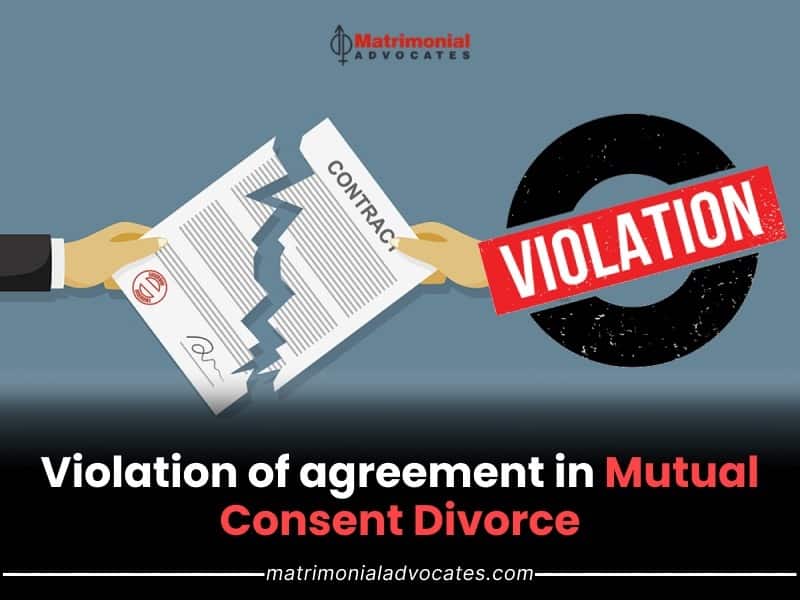
Guidelines for Mediation Settlement Agreement
In the case of Rajat Gupta v. Rupali Gupta, 2018 SCC OnLine Del 9005, the issue came before the Court that whether any guidelines are required to be followed by the Court while recording the undertaking/agreement of the parties with respect to a petition u/s 13B(1) or a motion u/s 13B(2) of the Hindu Marriage Act, 1955 or both for obtaining divorce?
The general guidelines suggested to be followed by the Court in the above mentioned case while recording undertaking/agreement of the parties are as under:
- Specify Names of Parties: The agreement must contain specific names of the parties.
- Ambiguous Terms Not To Be Used: The parties must be clearly denoted in the agreement and ambiguous terms such as ‘appellant, respondent, petitioner, etc.’ be avoided.
- All Details Be Included: All major and minor details must be included in the agreement.
- Timeline for Compliance: The timelines in compliance of the agreement must be clear and specific, there should not be any ambiguity in it.
- Incorporation of a Default Clause: A default clause should be incorporated in the agreement and the consequences thereof should be explained and enlisted in the agreement itself.
- Mode and date of Payment: The agreement must clearly include the amount, mode and date of payment. It should specify the amount that is to be paid by one party to another and the mode of the same that may be through cheque, demand draft, etc.
- Cases involving 498-A IPC: The agreement must clearly mention that all the pending cases including the case u/s 498A of the IPC shall be compromised or withdrawn.
- Criminal Complaints/Cross-cases: Criminal Complaints filed by parties against each other, pending trial or investigation should also find specific mention with names of all the parties, the Court concerned, and as to how the parties intend to deal with them. The number/details of the complaint, FIR, Sections under which they have been filed, should also be mentioned specifically.
- Terms of the Agreement- Read and Understood: The parties must read and understood the terms of the agreement, there should not be any lacuna in the language of the agreement.
- Signing of Agreement: The Agreement must be signed by both the parties and they should give consent to the terms and conditions of the agreement with their free mind and without any coercion.
Strict Compliance of Mutual Settlement Agreement
Praveen Singh Ramakant v. Neelam Praveen Singh Bhadauriya, 2019: Case Study
Introduction
The Supreme Court told in the aforesaid case to comply terms of compromise of mutual consent divorce or face contempt of court. A couple was told who obtained a divorce by mutual consent. The husband had approached the Supreme Court as the Allahabad High Court upheld the District Court’s wherein his plea for divorce was refused.
The Supreme Court referred the couple to mediation during the pendency of appeal. The parties to the matrimonial dispute agreed to amicable settlement in the matter and filed a separate application agreeing to dissolve their marriage by mutual consent invoking the powers under Article 142 of Constitution.
As per the terms of compromise between the parties, the husband agreed to pay Rupees Ten Lakh to wife, three lakhs to daughter. It was further agreed by the husband that Rupees one lakh shall be contributed by him at the time of solemnization of the marriage of the daughter. It was agreed by both that all the pending cases between the parties shall be withdrawn or quashed.
The marriage was dissolved by the Apex Court and the bench comprising Justices R. Banumathi and S. Abdul Nazeer stated that “In case of non-compliance of the terms of compromise, the parties would be liable for contempt of this Court in addition to other remedies available under law.”
Facts in brief
The parties were married on 07.05.1998. They had a girl child born out of the wedlock and she now turned 18 years. Due to strained relationship, the parties had been living separately. The husband has filed a suit for dissolution of marriage before the Family Court, Mumbai. The Trial Court dismissed the divorce petition filed by the husband through the judgment dated 09.11.2009.
An appeal was moved by the husband that was also dismissed by the District Court through judgment dated 29.11.2012. He approached the High Court and it also dismissed the second appeal preferred by the husband. Being aggrieved, the husband approached the Supreme Court of India.
Parties were referred to Mediation by the Supreme Court
The appeal was pending at the Supreme Court and the Court referred the parties to mediation and the parties have amicably settled the matter. The parties have moved a separate application wherein they agreed for dissolution of marriage by mutual consent.
As per the settlement between the parties, the husband has agreed to pay Rs.10,00,000/- (Rupees ten lakhs) to the wife in full and final settlement of her claims towards monthly maintenance past, present and future and in full quit of all other claims. The husband has agreed to pay Rs.3, 00,000/- in the name of the daughter. The husband also agreed to contribute Rs. 1, 00, 000 (one lakh) at the time of solemnization of the marriage of the daughter. It was mutually agreed between the parties that all the pending cases shall be withdrawn.
Decision of the Supreme Court
The Court noted while dissolving the marriage between the parties that the following terms of Compromise between the parties shall form part of this judgment which reads as under: “Both the parties hereto, had earlier arrived at an amicable mutual settlement on the following terms and conditions for divorce by mutual consent, before the mediation centre. It was agreed between the parties that they will pray for withdrawing/quashing before the Hon’ble Court/s to dispose of/quash the following pending cases, as mutually settled before the various Courts. The parties shall pray before the Hon’ble Court for the passing of the decree of divorce by mutual consent invoking the powers under Article 142 of the Constitution of India.”
It was further noted that in case of non-compliance of the terms of compromise, the parties would be liable for contempt of this Court in addition to other remedies available under law.





